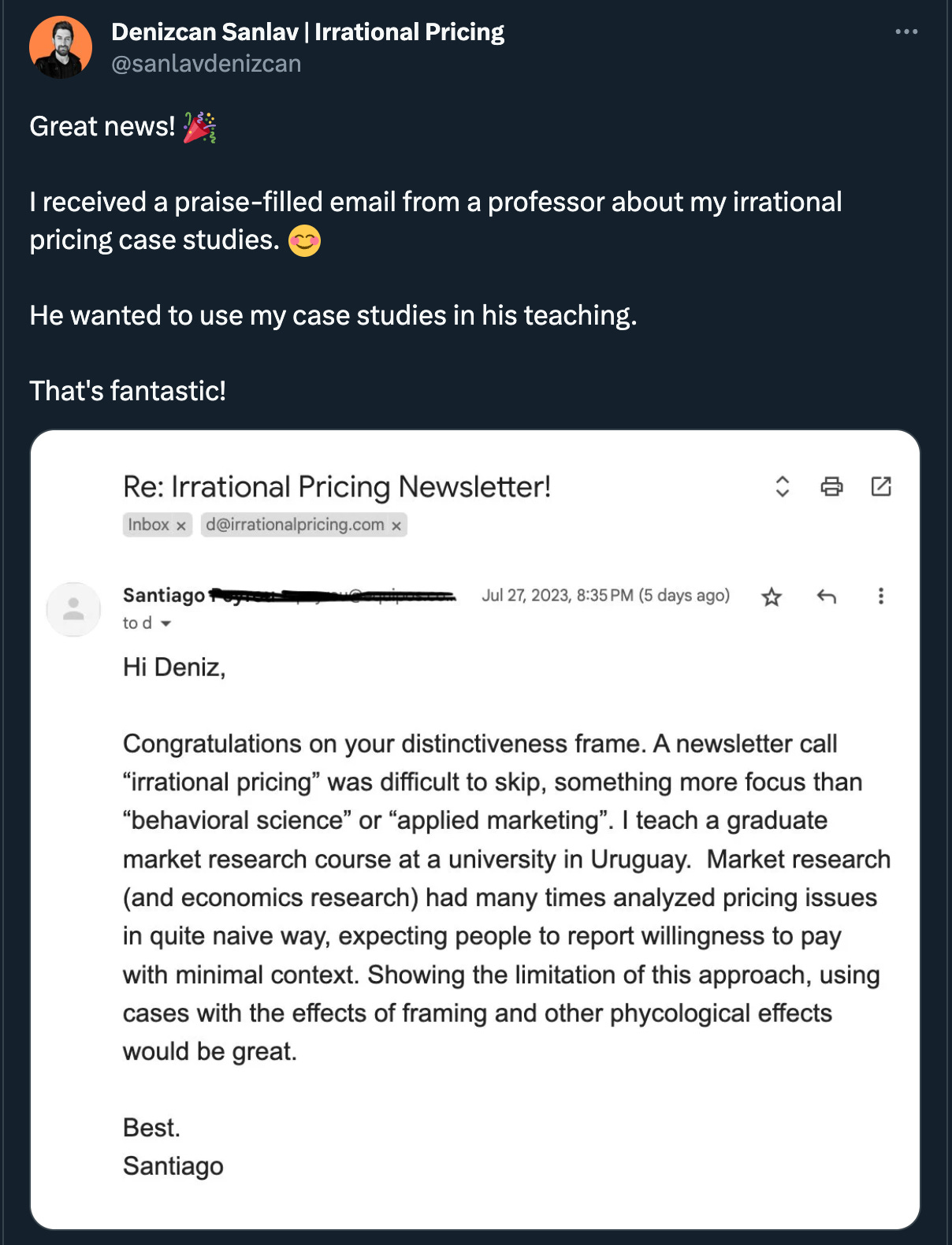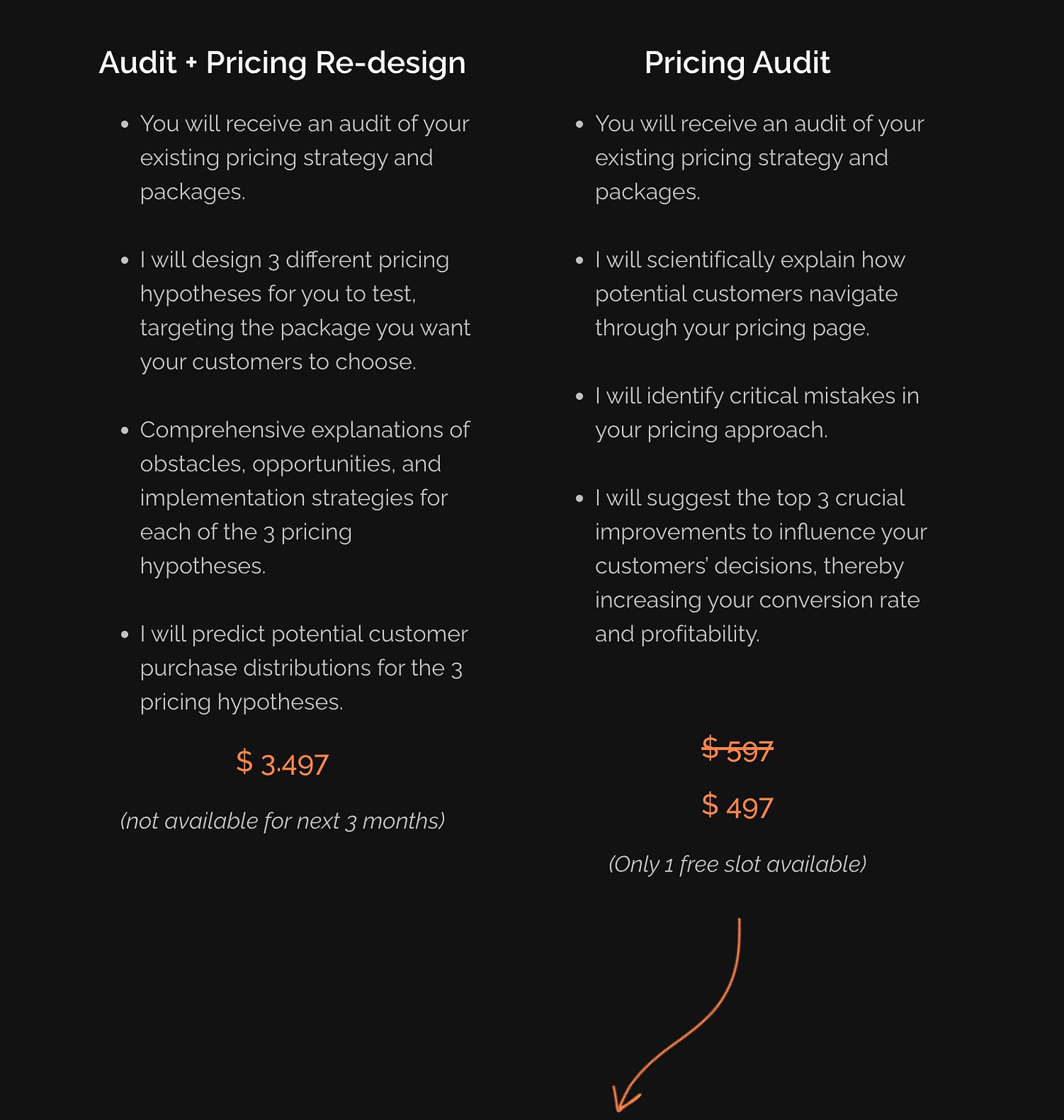Pricing Newsletter #6: Transforming potatoes into gold with Scarcity Bias:
Hi there! Denizcan here!
Welcome to a fantastic newsletter issue. In this issue, I’ll share an amazing story with you.
But first, I’ve got some great news to share.
(If you find this newsletter valuable, please subscribe here or share it with others who might find it valuable.)
Exciting news from me:
I got some fantastic feedback from a professor about my case studies.
See it on Twitter. Thanks, Santiago!1 available slot for Pricing Audit:
I’m conducting a pricing audit for products and services. My schedule is not available for the next 3 months. However, there’s 1 available slot for this month.
My new product “audit.landin.page” will be launched on Saturday at PH.
If you’re interested check out it.
In this issue, we’re going to do something different. It won’t be a case study.
Psychology and behavioral stories (despite what I know) keep surprising me. Today, I’ll share one of those amazing stories with you.
Scarcity worked its magic, making a whole community fall in love with potatoes.
When you declare something as incredibly special and inaccessible, it makes all of us want it even more.
Transforming potatoes into gold with Scarcity Bias:
And how to use it to convert potential customers in marketing and pricing.
Here’s the story: 🥔💫
Once upon a time in the olden days, there was a clever king named Frederick the Great. He had a smart idea to make people like potatoes more. At that time, potatoes were not very popular.
The people in his kingdom were worried about not having enough bread to eat. So the king thought of using potatoes as another food source to keep everyone fed and prices stable. However, the people didn’t want to eat potatoes because they were not familiar with them.
The king tried to force them to eat potatoes by making laws and fines, but it didn’t work. Some people said they didn’t want to eat potatoes because they weren’t mentioned in their religious book, and others questioned why they should try something new.
Instead of forcing them, the king decided to persuade them differently. He made a special potato garden in his palace and said that only the royals or those given permission could eat those potatoes. He even put guards around the garden to make it look like a treasure that needed protection.
But secretly, the guards were told not to watch too closely. This made people curious, and they found out they could get the potatoes themselves.
This trick worked like magic! By making potatoes seem special and hard to get, the king made everyone want them. The once-unwanted potatoes became a favorite food in the kingdom.
This story shows how scarcity can influence people’s behavior. When something seems rare or limited, people want it more. By making the potatoes exclusive to the royals, the king made everyone desire them.
This principle of scarcity bias extends beyond potatoes; it has a powerful impact on marketing and pricing strategies. When businesses create a sense of limited availability or time-sensitive offers, potential customers are more likely to convert into actual customers.
The fear of missing out (FOMO) drives people to take action and make a purchase before the opportunity disappears.
In the world of marketing, highlighting limited stock, limited edition products, or limited-time discounts can trigger scarcity bias in consumers’ minds. It ignites a sense of urgency and compels them to act swiftly to secure what they perceive as rare or exclusive.
Moreover, pricing strategies can also leverage scarcity bias to influence buying decisions. By offering discounts for a limited time or in limited quantities, businesses can nudge customers towards making a purchase.
Scarcity creates the perception of a unique opportunity, making the deal more attractive and enticing.
Thanks.
Good luck!
Denizcan.
Let’s stay connected.
Linkedin | Twitter | Threads | PH | Indiehackers | Reddit | Medium
Did you find this valuable?
This case study took me about 10 hours to write. If you found it useful, support it by sharing it with others.
You're leaving money on the table
I publish a few case studies every month. I choose a product/service in each case study. I explain how they will increase their revenues with their pricing strategies.
Learn to increase your revenue by designing your pricing with behavioral psychology.
It’s free.
( 0% unsubscribe rate )

